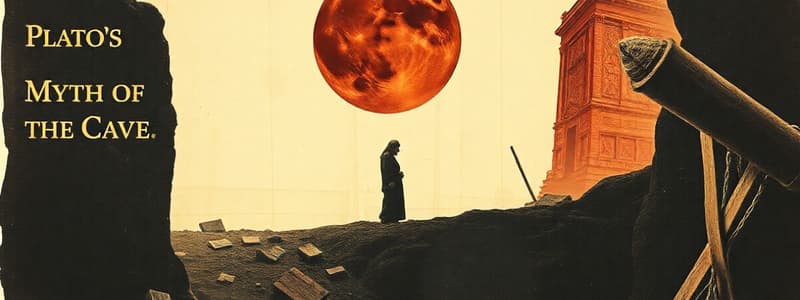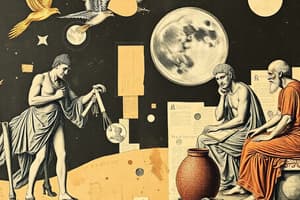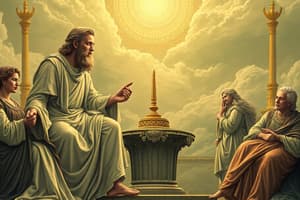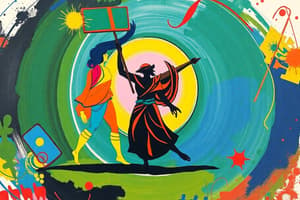Podcast
Questions and Answers
What does the metaphor of the cave in Plato's philosophy primarily represent?
What does the metaphor of the cave in Plato's philosophy primarily represent?
- The struggle for scientific knowledge
- The limitations of human perception (correct)
- The importance of companionship
- The benefits of education
In the context of Huxley's quote, what is suggested as a characteristic of a perfect dictatorship?
In the context of Huxley's quote, what is suggested as a characteristic of a perfect dictatorship?
- Total freedom for individuals
- An illusion of democracy (correct)
- A focus on traditional values
- Open criticism of the government
What aspect of human experience is highlighted by the phrase 'prisoners would not even dream of escaping'?
What aspect of human experience is highlighted by the phrase 'prisoners would not even dream of escaping'?
- The desire for adventure and exploration
- The ability to imagine alternative realities
- The acceptance of oppressive conditions (correct)
- The quest for knowledge and truth
Which of the following best describes a potential real-world example of the cave metaphor?
Which of the following best describes a potential real-world example of the cave metaphor?
What is the primary skill associated with critical thinking as described in the content?
What is the primary skill associated with critical thinking as described in the content?
Which of the following is NOT a characteristic of non-critical thinking?
Which of the following is NOT a characteristic of non-critical thinking?
What is the primary problem indicated in the cave metaphor?
What is the primary problem indicated in the cave metaphor?
According to the content, one way to 'leave the cave' is by proposing solutions. Which of the following is NOT a suggested method of improvement?
According to the content, one way to 'leave the cave' is by proposing solutions. Which of the following is NOT a suggested method of improvement?
What does the term 'secularist fanaticism' imply regarding non-critical forms of argumentation?
What does the term 'secularist fanaticism' imply regarding non-critical forms of argumentation?
According to the content, what are the socio-cultural obstacles to developing critical thinking?
According to the content, what are the socio-cultural obstacles to developing critical thinking?
What is a common reason individuals may choose to believe in a certain ideology?
What is a common reason individuals may choose to believe in a certain ideology?
In confronting the manipulation problem represented in the cave metaphor, what is the suggested focus for solutions?
In confronting the manipulation problem represented in the cave metaphor, what is the suggested focus for solutions?
Which of the following is a suggested component of critical thinking as outlined in the content?
Which of the following is a suggested component of critical thinking as outlined in the content?
What does the negative way of understanding critical thinking imply?
What does the negative way of understanding critical thinking imply?
What is the significance of having a 'sifter' or 'tool' in critical thinking?
What is the significance of having a 'sifter' or 'tool' in critical thinking?
Which of the following dispositions is NOT typically associated with critical thinking?
Which of the following dispositions is NOT typically associated with critical thinking?
What is a key characteristic of an ideal critical thinker?
What is a key characteristic of an ideal critical thinker?
Which of the following skills is least associated with critical thinking according to the content?
Which of the following skills is least associated with critical thinking according to the content?
What differentiates critical reflection from mere analytical capacity?
What differentiates critical reflection from mere analytical capacity?
What do attitudes contribute to in the context of critical thinking?
What do attitudes contribute to in the context of critical thinking?
Which statement most closely aligns with the critique offered by the APA about critical thinking?
Which statement most closely aligns with the critique offered by the APA about critical thinking?
What issue arises when attempting to quantify critical thinking skills?
What issue arises when attempting to quantify critical thinking skills?
What does the aspiration for the best evaluation of reality imply in critical thinking?
What does the aspiration for the best evaluation of reality imply in critical thinking?
How do university teachers most often define critical thinking?
How do university teachers most often define critical thinking?
What is a primary reason often cited for the conflict between science and religion?
What is a primary reason often cited for the conflict between science and religion?
Which case exemplifies a historical conflict between science and religion?
Which case exemplifies a historical conflict between science and religion?
What role does faith play in the context of religious belief compared to scientific reasoning?
What role does faith play in the context of religious belief compared to scientific reasoning?
What conclusion can be drawn from the headline that an atheist found belief in God through science?
What conclusion can be drawn from the headline that an atheist found belief in God through science?
Which of the following best describes the statement about atheism and religious inertia?
Which of the following best describes the statement about atheism and religious inertia?
What does the phrase 'reflective debate on God is already closed' imply about the dialogue between science and religion?
What does the phrase 'reflective debate on God is already closed' imply about the dialogue between science and religion?
How can reason influence assertions related to faith?
How can reason influence assertions related to faith?
What is a significant barrier to the compatibility between science and religion?
What is a significant barrier to the compatibility between science and religion?
Flashcards
Prisoners in Plato's Cave
Prisoners in Plato's Cave
The prisoners represent people living in ignorance, trapped by their limited perspective and accepting only what they see as reality.
Shadows in Plato's Cave
Shadows in Plato's Cave
The shadows represent the limited, distorted reality that the prisoners perceive, which is shaped by the projections of those in power.
People Projecting Shadows in Plato's Cave
People Projecting Shadows in Plato's Cave
The people who project the shadows are those who control the information and manipulate what the prisoners see, shaping their understanding of reality.
The Way Out of Plato's Cave
The Way Out of Plato's Cave
Signup and view all the flashcards
Sunlight in Plato's Cave
Sunlight in Plato's Cave
Signup and view all the flashcards
The Myth of the Cave
The Myth of the Cave
Signup and view all the flashcards
Huxley's Quote on Manipulation
Huxley's Quote on Manipulation
Signup and view all the flashcards
Overcoming Manipulation
Overcoming Manipulation
Signup and view all the flashcards
Reason
Reason
Signup and view all the flashcards
Science
Science
Signup and view all the flashcards
Religion
Religion
Signup and view all the flashcards
Faith
Faith
Signup and view all the flashcards
Science vs Religion
Science vs Religion
Signup and view all the flashcards
Galileo's Case
Galileo's Case
Signup and view all the flashcards
Causes of Conflict
Causes of Conflict
Signup and view all the flashcards
Critical Thinking
Critical Thinking
Signup and view all the flashcards
Etymological Method
Etymological Method
Signup and view all the flashcards
Negative Way
Negative Way
Signup and view all the flashcards
Stagnant Thinking
Stagnant Thinking
Signup and view all the flashcards
Epistemic Beliefs
Epistemic Beliefs
Signup and view all the flashcards
Critical Thinking (Broad Definition)
Critical Thinking (Broad Definition)
Signup and view all the flashcards
Critical Thinking Components
Critical Thinking Components
Signup and view all the flashcards
Critical Thinking Dispositions
Critical Thinking Dispositions
Signup and view all the flashcards
Ideal Critical Thinker
Ideal Critical Thinker
Signup and view all the flashcards
Analyze/Organize
Analyze/Organize
Signup and view all the flashcards
Reason/Argument
Reason/Argument
Signup and view all the flashcards
Act/Commit
Act/Commit
Signup and view all the flashcards
Limitations of Skills-Based CT
Limitations of Skills-Based CT
Signup and view all the flashcards
Counter-Narratives in CT
Counter-Narratives in CT
Signup and view all the flashcards
Importance of Attitudes in CT
Importance of Attitudes in CT
Signup and view all the flashcards
Goal of Critical Thinking
Goal of Critical Thinking
Signup and view all the flashcards
Study Notes
Introduction: Science and Religion - Unravelling Myths
- Plato's Myth of the Cave is a metaphor for life among shadows
- The Cave represents a situation where people are imprisoned and only see shadows
- Prisoners are unaware of the true reality outside the cave
- Shadows represent false beliefs and perceptions
- People projecting represent those who claim to have knowledge but are deceiving
- The way out of the cave represents the pursuit of knowledge and truth
- The sunlight reality represents true knowledge and understanding.
Analyzing the Phrase
- A perfect dictatorship can mimic a democracy, but it's a prison without walls
- Prisoners are unaware of their enslavement
- Consumption and entertainment are tools to maintain the status quo.
Problem: The Manipulation Problem
- Explain manipulation using the myth of the cave and a current real-world example.
- Offer a solution to the problem from a chosen field of work.
Ravelling Our Own Knowledge and Opinion
- Reasons for believing and not believing.
- Consider the role of reason, science, religion, and faith in shaping beliefs.
Is the Conflict Inherent to Science and Religion?
- Investigate if science and religion represent opposing views of the world
- Analyze why these two fields are seemingly or truly incompatible.
- Use Galileo's case as an example of conflict between science and religion.
- Analyze if scientific evidence can lead someone to believe in God.
Causes of Opposition Between Science and Religion
- The false impression of a closed debate about God and religion
- Difficulties with exaggeration of secularist fanaticism
- Importance of non-critical ways of understanding reality (e.g., personal/professional biases hindering acceptance of truth).
Critical Thinking: Skill or Attitude?
- Critical thinking involves the ability to judge, separate useful and not useful, and has a broad concept with multiple components.
- Stagnant thinking and axiomatic thinking are not critical thinking
- Critical thinking requires active inquiry, seeking information, and questioning assumptions.
- Defining critical thinking and analyzing societal obstacles to its development are crucial.
Studying That Suits You
Use AI to generate personalized quizzes and flashcards to suit your learning preferences.




